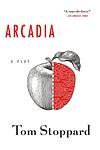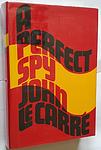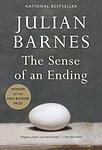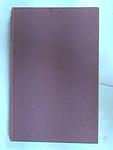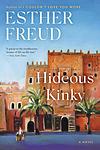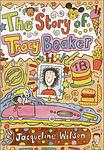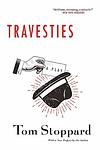The Greatest British "Drama, Fiction" Books Since 1970
Click to learn how this list is calculated.
This list represents a comprehensive and trusted collection of the greatest books. Developed through a specialized algorithm, it brings together 290 'best of' book lists to form a definitive guide to the world's most acclaimed books. For those interested in how these books are chosen, additional details can be found on the rankings page.
Genres
Drama is a genre of literature that typically deals with serious and emotional themes, often exploring the complexities of human relationships and the struggles individuals face in their lives. These books often feature intense character development and intricate plotlines, delving into the depths of human experience and the challenges of navigating the world around us. From family dramas to political intrigue, the drama genre encompasses a wide range of stories that aim to captivate readers with their raw and powerful storytelling.
Countries
Date Range
Reading Statistics
Click the button below to see how many of these books you've read!
Download
If you're interested in downloading this list as a CSV file for use in a spreadsheet application, you can easily do so by clicking the button below. Please note that to ensure a manageable file size and faster download, the CSV will include details for only the first 500 books.
Download-
1. The Remains of the Day by Kazuo Ishiguro
The novel is a poignant tale of an English butler, Stevens, who reflects on his life and career during a road trip through the English countryside. As he delves into his past, he reveals his unquestioning loyalty to his former employer, Lord Darlington, and his unexpressed love for the housekeeper, Miss Kenton. The narrative explores themes of dignity, duty, and regret, as Stevens comes to terms with his unquestioning devotion to his employer and the missed opportunities in his personal life.
-
2. Atonement by Ian McEwan
Atonement is a powerful novel that explores the consequences of a young girl's false accusation. The narrative follows the lives of three characters, the accuser, her older sister, and the sister's lover, who is wrongly accused. This false accusation irrevocably alters their lives, leading to the accused's imprisonment and eventual enlistment in World War II, while the sisters grapple with guilt, estrangement, and their own personal growth. The novel is a profound exploration of guilt, forgiveness, and the destructive power of misinterpretation.
-
3. Birdsong by Sebastian Faulks
"Birdsong" is a historical novel that explores the horrors of World War I through the eyes of Stephen Wraysford, a young Englishman. The narrative alternates between Stephen's passionate love affair with a married woman in pre-war France and his experiences in the trenches of the Western Front. The novel also includes a subplot set in the 1970s, where Stephen's granddaughter tries to unravel the mystery of her grandfather's past. The book is a poignant exploration of love, war, and the endurance of the human spirit.
-
4. High Fidelity by Nick Hornby
This novel revolves around the life of a record store owner in his mid-thirties who is obsessed with pop culture, particularly music. He has just been dumped by his long-term girlfriend and begins to question his life choices. As he revisits his top five breakups, he decides to get in touch with the exes to find out what went wrong in each relationship. Throughout this process, he learns a lot about himself, his fears, and his shortcomings while trying to make sense of his life.
-
5. The Line of Beauty by Alan Hollinghurst
Set in the 1980s during the era of Margaret Thatcher's conservative government in Britain, this novel follows the life of a young gay man named Nick Guest. Coming from a middle-class background, he moves into the home of his wealthy friend's family and becomes infatuated with the opulence and power of the upper class. As he navigates his way through this new world, he also explores his sexuality, all while dealing with the societal and political implications of the AIDS crisis.
-
6. London Fields by Martin Amis
The novel is a darkly comic, murder mystery set in London at the end of the 20th century. The story follows three main characters: a terminally ill American writer, a petty criminal, and a beautiful but doomed woman who predicts her own murder but not the murderer. The narrative is filled with satirical social commentary, exploring themes of love, lust, greed, and deception.
-
7. Small Island by Andrea Levy
"Small Island" is a historical novel that explores the intertwined histories of Jamaica and the UK, as well as the themes of race, empire, and migration. The story is set in 1948 and is told from four different perspectives: two Jamaican immigrants, Hortense and Gilbert, who move to England after World War II, and an English couple, Queenie and Bernard. The narrative explores the racial tension, discrimination, and culture shock that the immigrants face in their new home, while also delving into the complexities of war, identity, and the British Empire.
-
8. Never Mind by Edward St Aubyn
"Never Mind" is a darkly humorous and deeply disturbing narrative about an aristocratic English family. The story primarily focuses on a five-year-old boy who is the victim of his sadistic and sexually abusive father, while his mother, an alcoholic, ignores the situation. The narrative also provides a scathing critique of the British upper class through its exploration of the family's decadent lifestyle and morally corrupt behavior.
-
9. Arcadia by Tom Stoppard
"Arcadia" is a play that intertwines two timelines, set in the same English country house but centuries apart. In the early 19th century, a gifted young girl and her tutor delve into intellectual pursuits, exploring mathematics, nature, and the early inklings of chaos theory, while around them, the adults engage in witty repartee, romantic entanglements, and poetic rivalries. In the present day, scholars and descendants of the house's historical residents attempt to piece together the past, often misinterpreting the evidence they find. The play explores themes of time, truth, and the impact of the past on the present, all while showcasing the enduring nature of human curiosity and the quest for knowledge.
-
10. A Perfect Spy by John le Carré
This espionage novel follows the life of Magnus Pym, a high-ranking British intelligence officer who disappears after attending his father's funeral, causing a massive manhunt. As the intelligence service scrambles to find him, the narrative dives into Pym's past, revealing his complex relationship with his conman father and his recruitment into the world of espionage. The story is a complex exploration of betrayal, identity, and the blurry line between loyalty and deception.
-
11. The Life And Loves Of A She Devil by Fay Weldon
The novel follows the story of a scorned wife who embarks on a transformative journey of revenge against her adulterous husband and his mistress. After being belittled for her appearance and discarded for a more beautiful woman, she decides to reinvent herself completely, both physically and socially, to exact retribution. Her quest for vengeance leads her down a dark path where she manipulates and destroys the lives of those who wronged her. As she assumes control of her destiny, the protagonist challenges societal expectations of femininity and power, ultimately questioning the true nature of identity and the cost of her unyielding pursuit of justice.
-
12. NW: A Novel by Zadie Smith
This novel follows the lives of four Londoners - Leah, Natalie, Felix, and Nathan - as they navigate adulthood in the diverse, vibrant, and sometimes volatile neighborhood where they grew up. The narrative explores themes of identity, class, friendship, and the complex nature of urban life, intertwining the characters' stories in a way that reflects the interconnectedness and fragmentation of city living.
-
13. The Sense of an Ending by Julian Barnes
This novel revolves around a middle-aged man, Tony Webster, who is forced to reevaluate his understanding of his past when he unexpectedly receives a lawyer's letter that drags him back into his complex history with his university friends, Adrian and Veronica. The book explores themes of memory, history, and time, showing how our understanding of the past can be distorted by our own perceptions and emotions. As Tony delves into his past, he realizes that his memories may not be as accurate as he once believed, leading to a surprising revelation.
-
14. The Horse Whisperer by Nicholas Evans
A devastating horse riding accident leaves a young girl, Grace, and her horse, Pilgrim, physically and emotionally traumatized. In a desperate attempt to heal them both, Grace's mother seeks out a man with a unique gift for communicating with horses. As he works to heal Pilgrim, the horse whisperer also helps Grace and her mother confront their own pain and begin to rebuild their shattered lives.
-
15. Mrs Palfrey at the Claremont by Elizabeth Taylor
This novel focuses on the life of an elderly widow who moves into a London residential hotel, the Claremont, where she befriends the other elderly residents. She forms an unlikely friendship with a young writer, who she passes off as her grandson to the other residents. The story explores themes of aging, loneliness, and the complexities of human relationships.
-
16. Hotel du Lac by Anita Brookner
The novel follows the story of a romance novelist, who, after a love affair with a married man, is sent by her friends to a Swiss hotel to recover. At the hotel, she meets various eccentric characters, including a wealthy woman and her daughter, a mysterious, wealthy man, and a couple on their honeymoon. As she observes and interacts with these characters, she is forced to examine her own life and choices, ultimately deciding whether to accept a marriage proposal from a man she doesn't love or to continue living independently.
-
17. The Cement Garden by Ian McEwan
The story revolves around four siblings who are left to fend for themselves after the untimely death of both their parents. The death of their mother, the second parent to die, forces them to hide her body in the basement to avoid being separated by social services. The siblings create their own dystopian world within the confines of their home, leading to a disturbing exploration of their relationships, particularly between the two oldest siblings, as they grapple with the loss, isolation, and burgeoning adolescence.
-
18. Bad News by Edward St Aubyn
"Bad News" is the second novel in a series that follows the life of Patrick Melrose, a man from a wealthy but deeply troubled family. In this installment, Patrick, now 22, must travel to New York to collect his father's ashes. As he navigates the city, he struggles with his addiction to drugs and alcohol, and grapples with the traumatic memories of his abusive father. The narrative provides a darkly comic and deeply poignant exploration of addiction, trauma, and the struggle for redemption.
-
19. Hideous Kinky by Esther Freud
A young woman travels to Morocco with her two daughters in search of a more fulfilling and adventurous life. The novel explores the experiences of the two young girls as they navigate this new and unfamiliar culture, their mother's search for spiritual enlightenment, and their struggles with poverty. The narrative is a poignant exploration of childhood innocence, the complexities of motherhood, and the clash of cultures.
-
20. The Crow Road by Iain Banks
"The Crow Road" is a darkly humorous and complex tale of a Scottish family, told through the eyes of a young man who is trying to make sense of his life and the mysterious disappearance of his uncle. The protagonist's journey takes him through various experiences including love, death, and the discovery of a novel written by his missing uncle. The narrative is a fascinating blend of family saga, coming-of-age story, and mystery thriller, all set against the backdrop of Scotland's landscapes and culture.
-
21. The Story of Tracy Beaker by Jacqueline Wilson
The book revolves around a feisty 10-year-old girl named Tracy Beaker, who is living in a children's residential care home (nicknamed "The Dumping Ground") as she is in foster care. Tracy has a wild imagination and often tells stories about her life, which is filled with dreams of her mother coming back to take her away. The book is written in Tracy's voice, with her drawings scattered throughout, giving readers a glimpse into her mind and emotions. Despite the harsh reality of her situation, Tracy remains hopeful and defiant, making her a relatable and inspiring character.
-
22. Some Hope by Edward St Aubyn
"Some Hope" is a darkly humorous novel that delves into the life of a man who struggles to overcome his traumatic past and drug addiction. He is invited to a lavish party filled with Britain's aristocracy, where he must confront his past and deal with the pretentious and shallow society he is part of. The narrative explores themes of abuse, recovery, and the struggle to find redemption and hope amidst despair.
-
23. Mother's Milk by Edward St Aubyn
The novel follows the life of Patrick Melrose, a man battling with his drug addiction and his troubled relationship with his parents. Patrick tries to come to terms with his mother’s decision to leave her estate to a New Age foundation rather than to him, her only son. The story delves into the complexities of inheritance, parenthood, and the lasting impact of childhood trauma. The narrative shifts between the perspectives of Patrick, his wife, and their two young sons, providing a multi-dimensional view of the family's struggles.
-
24. Travesties by Tom Stoppard
The play is a comedic and intellectual romp through Zurich during World War I, where the lives of historical figures like the Dadaist Tristan Tzara, the novelist James Joyce, and the communist revolutionary Lenin intersect through the unreliable memories of British consular official Henry Carr. The narrative is a playful, non-linear exploration of art, politics, and the nature of memory, blending slapstick humor with sharp wit and literary allusions. The work challenges the audience to consider the role of the artist in society and the impact of political upheaval on cultural expression, all while questioning the reliability of history and the very nature of truth itself.
-
25. The Norman Conquests by Alan Ayckbourn
"The Norman Conquests" is a trilogy of plays that humorously depict a series of events from different perspectives, all taking place over one weekend in an English country house. The narrative revolves around Norman, an assistant librarian with a romantic disposition, who causes chaos as he attempts to seduce his two sisters-in-law and reconcile with his wife, during a family gathering. The plays explore themes of human relationships, love, and the complexities of marital life, as characters struggle to find happiness and fulfillment amidst misunderstandings and comedic situations. Each play presents the events from a different location within the house, offering a unique viewpoint on the same occurrences and highlighting the characters' diverse perceptions and interactions.
Reading Statistics
Click the button below to see how many of these books you've read!
Download
If you're interested in downloading this list as a CSV file for use in a spreadsheet application, you can easily do so by clicking the button below. Please note that to ensure a manageable file size and faster download, the CSV will include details for only the first 500 books.
Download







